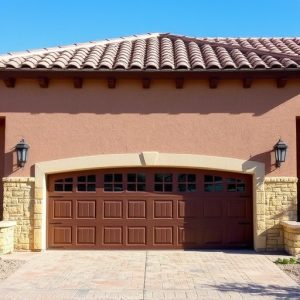Tucson garage doors require regular maintenance and prompt attention to common issues for optimal functionality and safety. Spring problems, faulty sensors, worn-out rollers, and damaged cables are frequent culprits. Homeowners should prioritize safety by ceasing door usage until a qualified technician addresses unexpected malfunctions. Electrical issues often stem from faulty circuit breakers or outdated systems, requiring professional repair services. Regular maintenance like lubricating hinges and rollers can prevent loud noises and vibrations caused by worn-out components. Conducting routine checks and using silicon-based lubricant significantly enhance the durability of Tucson garage doors.
In Tucson, understanding your garage door’s mechanisms is key to preventing common problems. Whether it’s a lack of power due to electrical issues, doors that won’t open or close, or loud noises indicating a malfunctioning source, proper knowledge enables effective DIY troubleshooting. This guide delves into these issues and offers solutions tailored for Tucson garage doors, empowering you with the tools to maintain and prolong their lifespan.
- Understanding Tucson Garage Door Mechanisms and Common Malfunctions
- No Power: Electrical Issues and Their Solutions
- Door Won't Open or Close: Manual Override and Remote Troubleshooting
- Loud Noises and Vibrations: Identifying and Addressing Source
- Maintenance Tips for Longevity: Regular Checks andLubrication
Understanding Tucson Garage Door Mechanisms and Common Malfunctions
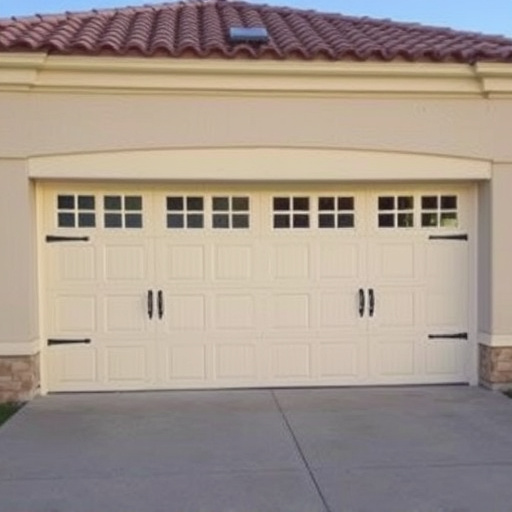
Tucson garage doors, like any mechanical system, are subject to wear and tear over time. Understanding their basic mechanisms is crucial in diagnosing and addressing common problems efficiently. The typical Tucson garage door operates on a system of springs, cables, pulleys, and a motor. These components work together to raise and lower the door. Spring issues, including stretched or broken springs, are frequent culprits in malfunctions, leading to doors that either won’t open or close properly.
Other common problems include faulty sensors causing automatic opening errors, worn-out rollers resulting in uneven door movement, and loose or damaged cables potentially rendering the door inoperable. Regular maintenance, such as lubricating hinges and rollers and testing sensors, can prevent many of these issues. When Tucson garage door problems arise, homeowners should prioritize safety by stopping usage until a qualified technician examines and repairs the system.
No Power: Electrical Issues and Their Solutions
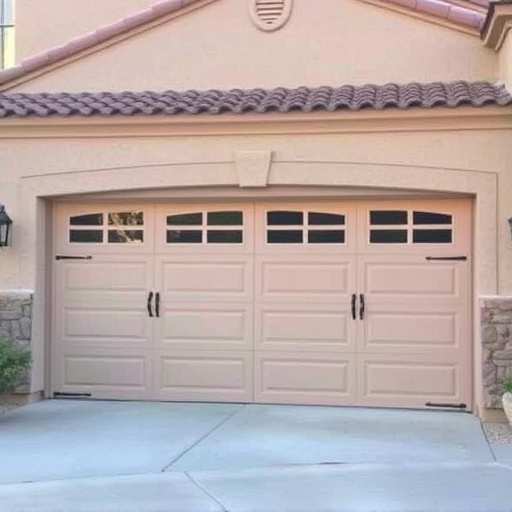
When your Tucson garage doors stop working, one of the most common issues is a lack of power, often indicating an electrical problem. This can be caused by various factors, such as a faulty circuit breaker or a blown fuse, especially if your home’s electrical system is old or overloaded. The first step in troubleshooting is to check your circuit breakers and replace any fuses that may have tripped. Ensure the garage door opener is properly connected to a working power source, as a loose connection can also lead to power outages.
If these basic checks don’t resolve the issue, there might be problems with the motor or control board of the garage door opener. Over time, these components can wear out and require replacement. Contacting a professional Tucson garage doors repair service is advisable in such cases, as they have the expertise and tools to diagnose and fix complex electrical issues effectively and safely.
Door Won't Open or Close: Manual Override and Remote Troubleshooting
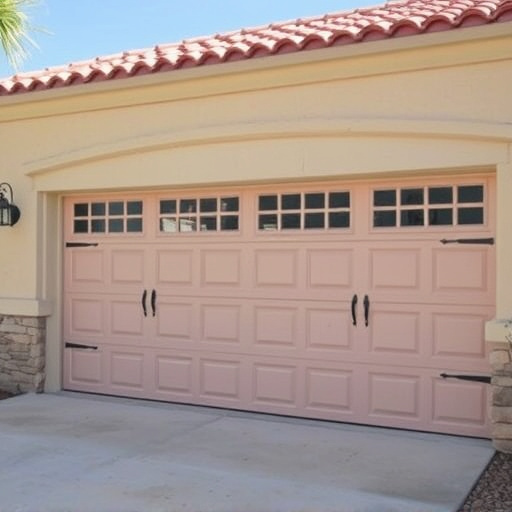
If your Tucson garage door is acting up and won’t open or close properly, there are a few steps you can take to troubleshoot the issue before calling in a professional. One common problem is a misaligned track, which can be adjusted using tools readily available at home improvement stores. Check for loose or bent tracks, and use a level to ensure they’re properly aligned. If the door still won’t budge, it could be stuck due to debris or oil buildup. A thorough cleaning and lubrication of the tracks and roller assembly might be all that’s needed to free up the door.
For added convenience, many modern garage doors come with a manual override mechanism. This allows you to open or close the door by hand if power fails or the remote control is lost. If your door has this feature, try operating it manually to see if the problem persists. If not, consider updating your Tucson garage doors with a newer model that includes advanced features and improved troubleshooting capabilities for added peace of mind.
Loud Noises and Vibrations: Identifying and Addressing Source
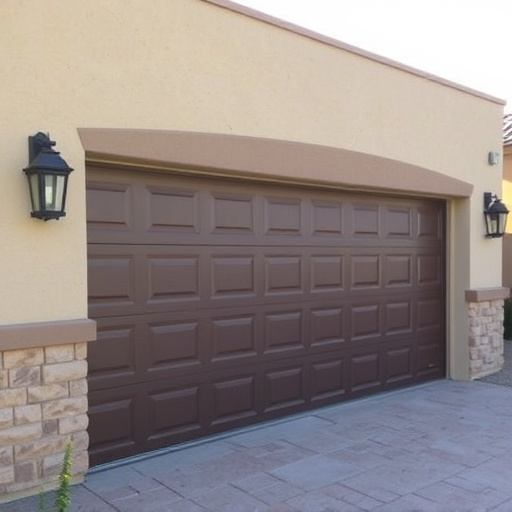
Loud noises and vibrations from your Tucson garage doors can be both unsettling and indicative of potential safety hazards. Identifying the source of these issues is crucial for addressing them effectively. Common culprits include worn-out or misaligned tracks, damaged springs, or loose rollers. These components play a vital role in the smooth operation of your garage door, and their dysfunction can lead to excessive noise and vibrations.
To pinpoint the exact problem, observe the specific sound or vibration patterns. For instance, a high-pitched screeching could signal worn out rollers, while a loud thud might suggest a damaged spring. Regular maintenance checks, including lubricating hinges and rollers and tightening connections, can help prevent these issues. If the problem persists, consider professional assistance from Tucson garage door experts who can diagnose and repair the issue safely and efficiently.
Maintenance Tips for Longevity: Regular Checks andLubrication
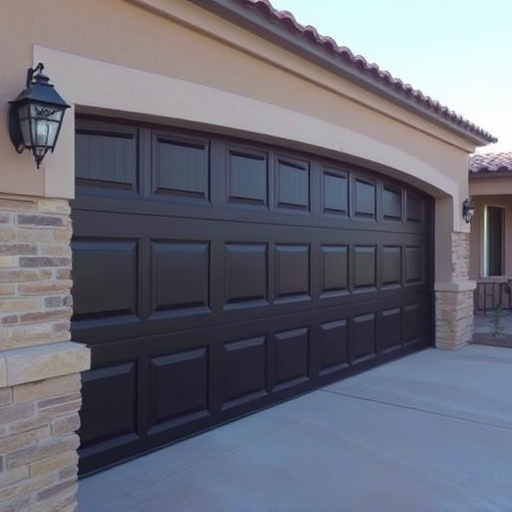
Regular maintenance is key to ensuring your Tucson garage doors function optimally and last for years to come. One of the simplest yet most effective practices is conducting routine checks, aiming to identify any potential issues early on. Inspect all moving parts, paying close attention to hinges, springs, and track alignment. Small problems like bent tracks or loose screws can be easily fixed, preventing more complex (and costly) repairs down the line.
Lubrication is another vital maintenance step. Apply a silicon-based lubricant to sliding tracks and door rollers, which will help reduce friction and ensure smooth operation. Regular lubrication also prevents rust buildup, especially in Tucson’s arid climate, where moisture can accelerate metal corrosion. By incorporating these simple practices into your garage door upkeep routine, you’ll significantly enhance the longevity of your investment in Tucson Garage Doors.
Whether you’re dealing with a Tucson garage door that won’t open, power issues, or excessive noise, understanding the common problems and their solutions can save time and money. Regular maintenance, including lubrication and periodic checks, is key to ensuring your Tucson garage doors operate smoothly and silently for years to come. By tackling these issues proactively, you can avoid costly repairs and maintain the efficiency of this essential entry point into your home or business.
